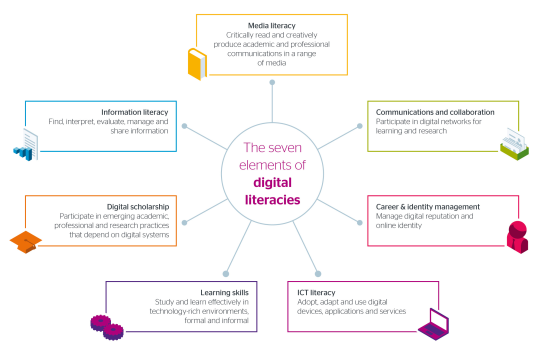In this series of articles, the Educational Technology team will be providing an insight into existing practice using technology for learning and teaching at Falmouth University and also at projects being undertaken within the wider HE sector.Our previous articles have looked at Assessment, Feedback and Open Education.
The term ‘Digital Literacy’ has origins which date back to the 1960s as Doug Belshsaw notes in What is ‘Digital Literacy’? and encompasses comprehension and understanding around use of technologies.
Henry Jenkins describes it as the ability to effectively and critically navigate, evaluate and create information using a range of digital technologies. It requires one “to recognize and use that power, to manipulate and transform digital media, to distribute pervasively, and to easily adapt them to new forms”. One of the best definitions in my opinion comes from Josie Fraser who describes it in terms of function and socio-cultural development:
Digital Literacy = digital tool knowledge + critical thinking + social engagement
Fraser’s work with the DigiLit Leicester project presents an excellent framework of reference for educators in understanding how we support these literacies. It has led to the local council driving forward use of OER and giving express permission to schools and colleges to make use of open materials in the physical and virtual classroom.
From 2011-2013 Jisc ran a project around digital literacies, which built on a Digital Literacy framework developed by Beetham and Sharpe (2010) to describe 7 elements that combine to form our digital literacies (Fig.1). A further ongoing project looks at the digital capabilities our institutions need to scaffold the development of these literacies.

Figure 1 – Seven elements of digital literacies from the JISC Digital Literacy project.
Online, Mozilla continues to encourage people by using an experiential approach to learning, with Teach The Web and Code Club partners volunteering with community groups to teach coding to kids.
In Finland, digital literacies are embedded in the core curriculum and the recent House of Lords Digital Skills report urges Universities to ensure the digital competency of their graduates so that they have the necessary skills to thrive in the future workplace.
At Falmouth, the ET team organises a range of drop in events aimed at sharing practice, trying out new tools and discussing the ever evolving world of Educational Technology. Last year we ran a series of 10 workshops ranging in theme and included a mobile learning speed geek/picnic, where staff got to move around the room discussing ‘mobile first’ design approaches to learning and new apps and technologies in the mobile environment.
We’re always up for doing more of this kind of stuff and talking about developing student literacies within taught courses, so get in touch if you have any thoughts/ideas around the subject.